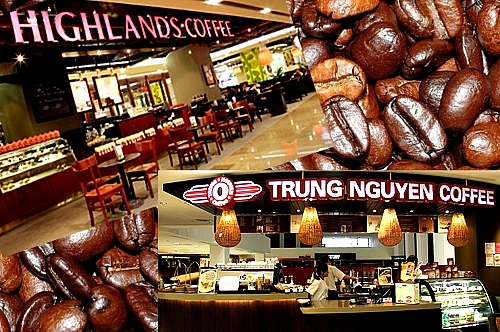Trung Nguyen brand is threatened from domestic competition
Rising competitors and more strict competition
 |
| Trung Nguyen's coffee shops number less than half of Highlands' shops |
Along with Vinacafé and Nestlé, the Vietnamese coffee market welcomed a range of new brands, including Highlands, The Coffee House, and Starbucks.
zing.vn stated that currently the number of Trung Nguyen coffee shops is 60, less than half the number of Highlands stores (150). Furthermore, new coffee brand The Coffee House raised its stores to 80 and has started exporting coffee bought from Cau Dat Farm.
Additionally, the domestic market also saw the entry of a brand that was previously entirely alien to coffee—NutiFood. In 2017, NutiFood announced pouring VND1 trillion ($44 million) into growing coffee plants in the Central Highlands province of Dak Lak. This firm is also a strategic shareholder of Phuoc An Coffee JSC, a coffee company in Dak Lak that has an export turnover of $12-15 million per year.
Tran Thanh Hai, chairman of NutiFood’s Board of Management, said that the firm will boost processing and exporting organic coffee, targeting the Japanese and the US markets.
Previously, three years after entering Vietnam, in early 2016, Starbucks officially started offering its Vietnamese “DaLat Blend” in 56 markets. These high-quality coffee beans are sourced from Dalat (Central Highlands province of Lam Dong).
| Trung Nguyen’s dreams of global ambition drown in divorce dispute |
Regarding domestic instant coffee processing segment, Trung Nguyen proves to be more inferior than its long-term competitors Vinacafé and Nestlé.
Since merging with Masan one year ago, Vinacafé’s output has increased by 30 per cent and the firm’s products have been exported to Russia and East European countries. A report released by market research company Nielsen stated that in 2015 Vinacafé led the domestic instant coffee market by holding 41 per cent, equaling the cumulative market shares of Nescafé and Trung Nguyen.
Masan currently owns 68.5 per cent of Vinacafé's shares and offered to purchase Vinacafé entirely for VND1.7 trillion ($74.9 million).
According to giaithuong.org.vn, a website specialised in national brands, as of November 2017, Vinacafé made up 50 per cent of the domestic instant coffee market.
According to data released by Euromonitor—a global market research company—Vinacafé and Nescafé in 2015 made up 37.5 and 38.3 per cent of the domestic instant coffee market, while Trung Nguyen only took up 4.7 per cent.
 |
| Trung Nguyen's G7 instant coffee products |
Three-year divorce endangers Trung Nguyen
Despite having been a Vietnamese coffee empire, Trung Nguyen is hugely affected by the overlong divorce dispute between chairman Dang Le Nguyen Vu and his wife Le Hoang Diep Thao.
| The dispute exploded in April 2015, when Vu suddenly dismissed Thao from her position as the group’s deputy general director. In a complaint sent to the Binh Duong People’s Court in November 2015, Thao said that in October of the same year Vu organised a board management meeting without her to dismiss her from her positions as chairman of the Board of Management and deputy general director. |
After Thao’s complaint sent to the Binh Duong People’s Court in 2015, Trung Nguyen’s G7 instant coffee products were suddenly pulled from the market due to “equipment maintenance.”
Afterwards, on December 12, 2015, Trung Nguyen announced resuming selling G7 instant coffee products on the market.
Three years after the divorce proceedings started, Trung Nguyen Group has been reporting weak growth.
According to dantri.com.vn, its net sales in 2015 and 2016 were VND3.846 trillion ($169 million) and VND3.813 trillion ($167.9 million), respectively, and its profit was VND809 billion ($35.6 million) and VND768 billion ($33.8 million).
Previously, in 2014, Trung Nguyen Group’s revenue and before-tax profit reached VND4 trillion ($176 million) and VND1.3 trillion ($57.2 million). In fact, this came from the 2012-2014 profits of its main subsidiaries (Trung Nguyen JSC specialised inexporting coffee to aboard markets and Trung Nguyen IC specialised in instant coffee processing ) transferred to the parent company Trung Nguyen Group.
With the slowdown in growth and the fierce competition from old nemeses and newcomers, Trung Nguyen Group has its work cut out for it to balance the damage wrought by the divorce dispute.
| Trung Nguyen Legend Corporation specialised in high-end coffee products on May 24 announced entering an official co-operation with China-based Shanghai Qinzhou Trade Co., Ltd. to distribute the G7 instant coffee products in East China, including Shanghai, Hangzhou, Suzhou, and Nanjing, with the revenue target of $1.6 billion. The value of Chinese coffee market is estimated at $9 billion, according to zing.vn. |
What the stars mean:
★ Poor ★ ★ Promising ★★★ Good ★★★★ Very good ★★★★★ Exceptional
Related Contents
Latest News
More News
- Vietnamese businesses diversify amid global trade shifts (February 03, 2026 | 17:18)
- Consumer finance sector posts sharp profit growth (February 03, 2026 | 13:05)
- Vietnam and US to launch sixth trade negotiation round (January 30, 2026 | 15:19)
- NAB Innovation Centre underscores Vietnam’s appeal for tech investment (January 30, 2026 | 11:16)
- Vietnam moves towards market-based fuel management with E10 rollout (January 30, 2026 | 11:10)
- Vietnam startup funding enters a period of capital reset (January 30, 2026 | 11:06)
- Vietnam strengthens public debt management with World Bank and IMF (January 30, 2026 | 11:00)
- PM inspects APEC 2027 project progress in An Giang province (January 29, 2026 | 09:00)
- Vietnam among the world’s top 15 trading nations (January 28, 2026 | 17:12)
- Vietnam accelerates preparations for arbitration centre linked to new financial hub (January 28, 2026 | 17:09)

 Tag:
Tag:























 Mobile Version
Mobile Version